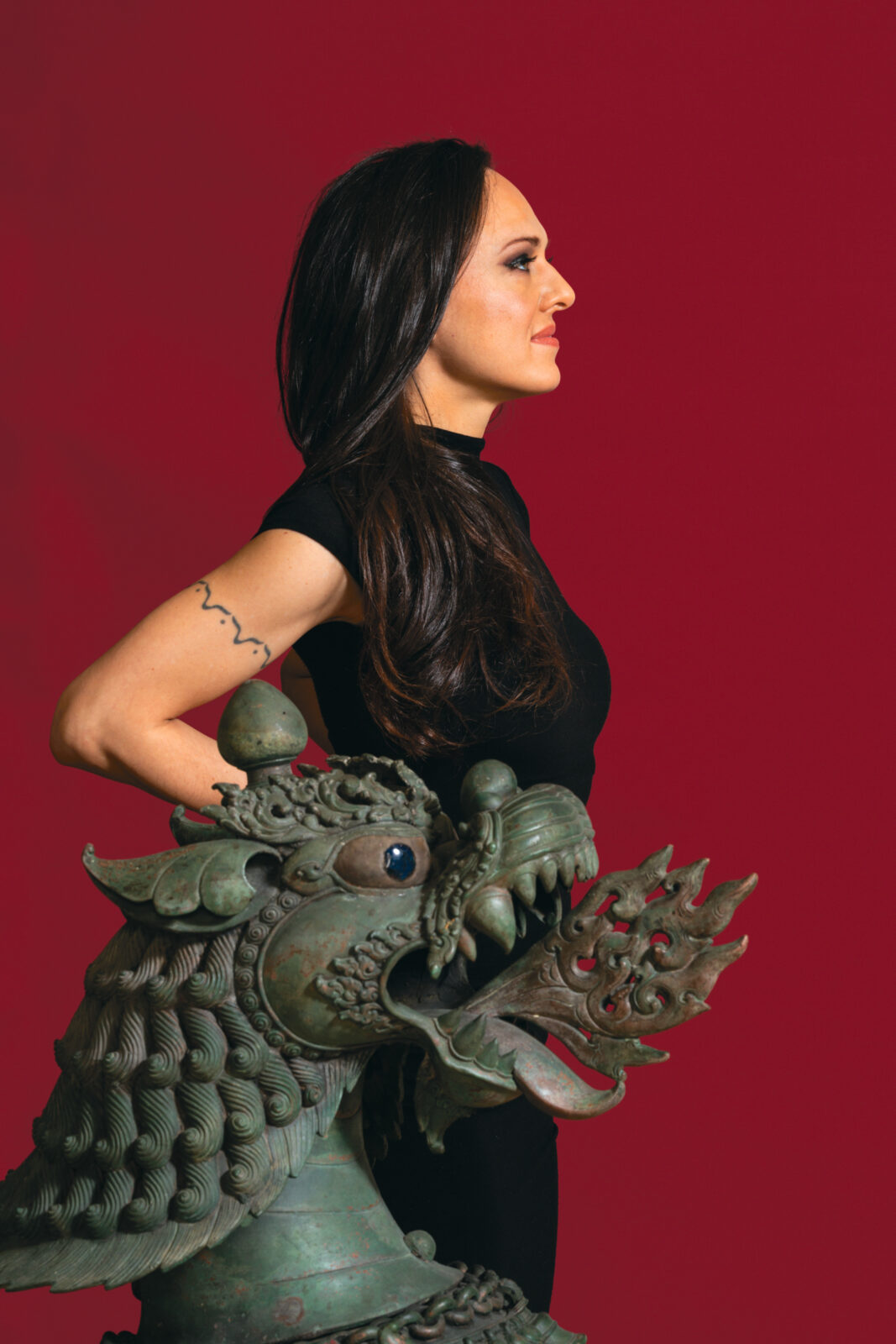
Photograph by Nicholas Calcott

Photograph by Nicholas Calcott
Just over five years ago, Kasia Urbaniak founded The Academy, a school that teaches women the foundations of power and influence. Today, her teachings are more popular than ever. Her unique curriculum represents a total paradigm shift for both women and men.
In Academy lexicon, the word “you” is dominant and the word “I” is submissive. Neither is inherently superior. “If I’m in control of you, my attention is outward, so precisely fixed on the other person that I almost forget I exist,” Kasia explains, “If you’re submissive, your attention is focused inward, on yourself and your feelings.”
This exchange of self for other is common to many Eastern spiritual traditions, including both Daoism and Buddhism. Contrary to what Western culture teaches us about the primacy of the self, a shift in focus towards the other can be surprisingly liberating, expansive, and empowering as well as compassionate. When we focus on the other, we let go of our limited, perhaps somewhat fearful and defensive sense of self. In essence, forgetting we exist in this way allows us to realize our fullest potential and to become much more beneficial and effective.
“I believe that the most compassionate thing a teacher can offer is the most practical thing,” Kasia says. Her highly practical and timely teachings designed to help women expand their power are born out of two seemingly opposite but surprisingly symbiotic endeavors: training as a Daoist healer and nun and working as one of the world’s most successful dominatrixes.
“Spiritual journeys can be expensive,” she explains of her travels to the far reaches of the Far East seeking out teachings from the great masters of Daoist alchemy. “I was working as a dominatrix to make money. It was the best way that my nineteen-year-old self could pay for college, support my sister, and travel around the world looking for all the most magical masters I could dream of studying with; I could afford to be fanciful and adventurous.”
But as she began to see both experiences as trainings, her occupation and her avocation started playing together in unexpected ways.
“In the very beginning, the domination and the Daoism were very far from each other. I was doing one in order to do the other. As a student, I was learning martial arts and how to diagnose human bodies, to see the intention of energy in somebody’s chi, whether they wanted to attack or pull away, when they energetically expanded or when they contracted. I started to see the energy in medical diagnosis, where something’s stagnant and where it’s moving. I didn’t expect this to happen, but the same things started showing up for me as a dominatrix in the dungeon—this expansion and contraction of energy; where somebody was really held in my attention and under my authority became palpable and obvious.
“When I watched some of the best dominatrixes in the world do their work I saw similarities between what they were doing and what the nuns I knew in China were doing. They were energetically super grounded and also willing and able to penetrate energetically the space of an other. In the case of the dominatrix, meaning the space of a man.
“I started seeing this wild disparity between powerful and less powerful women. On the one hand, I saw how both dominatrixes and Daoist nuns were solidly grounded in their power, while the vast majority of women I knew were struggling with a mass of assumptions, superstitions, and fears about men, love, romance and men, power, work, career. There’s always an energetic precedent to losing your voice, not being able to stand in your power. It has to do with this retraction of energy.
“For many years of the years I studied Daoist alchemy, most teachers were men. I was hungry to delve deeper into the manipulation of the female hormone system, so I found one of the highest level female Daoist abbots in China in one of the country’s oldest female-led monasteries.
“In this monastery, I reached the point where I was ready to completely commit myself to this path. But four days before I was to be ordained, I got a call from my mother that she had been diagnosed with breast cancer. Making the choice between staying and going, I just felt, instinctively, that I’d been doing all of this all these years so I could be there for mother in that moment. On that day that I landed in Warsaw, Poland, where my mother lives, in 2008, China experienced one of its biggest earthquakes in history and the epicenter was forty-five kilometers from the convent.”
She lived, not only to help her mother beat cancer, but to launch a career as a teacher, devoted to helping other women access their power.
Self-identified spiritual people sometimes talk of being “in the world, but not of it” in terms of shifting our deepest intentions towards more meaningful, less mundane goals and transcending cultural assumptions and limitations. But this can be a tricky balance, especially if we want to be of benefit to the world in which we live.
This has been a central theme for Kasia. “At the very end of my Daoist training, when my mom got sick, I very suddenly became ‘of the world’ and it all became, in an instant, intensely personal and practical,” she says. What became most practical for her at that time was a shift from a male clientele to a focus on the female, but with the lessons of the dungeon still informing her work.
“The most common misperception about being a dominatrix is that it’s about sex,” Kasia explains. “It’s erotic, energetically, but it’s actually the one place that you are not allowed to have sex. One of my biggest challenges as a dominatrix was to be able to create an hour-long session primarily based on language and attention. You have to bring the erotic in the room and make it fully expansive and satisfying and have it peak and arc without sex. As I mastered that, I started understanding how all attention is essentially erotic because it carries the life force. Feeling alive is erotic. So many things that weren’t sex or sexual started becoming erotic for me. I felt the viscosity of attention, the ability to use attention as an erotic force, and it blew my mind.
“When I left the dungeon, I realized I was more awake to how alive the world is. Instead of dividing things into good and evil, I saw things as alive and dead, hot and cold. I started moving towards what was alive because I knew it was going to turn me on, physically, intellectually, spiritually . . . I was just looking for the life force. I started to use this to help dissolve stuck dynamics between couples, people who were lost in their heads or looking to overcome blocks in their careers. The fastest way to resolve these problems always had to do with finding the hottest spot and working from there.”
The dominatrix led the Daoist, and vice versa. Whether her students are more interested in her background as a Daoist or as a Dominatrix, the time for her teachings is clearly now.
In Her Own Words: Kasia Urbaniak on Empowering Men and Women from the Inside Out
What domination and Daoism have in common is that, fundamentally, healing requires energetic authority of the same type that a transcendent, transformational domination session requires.
To be able to surrender fully to another person who can hold that energy well, that kind of surrender is not at all unlike some of the states we enter as we approach meditation. I wouldn’t say that it’s a meditative state. I would say it’s the approach towards the self and self-knowledge.
The fact that so many men need this wild, kinky excuse to have this experience of going inward does not surprise me. It’s not surprising that some of the hardest-working, most apparently “held-together” men need this theatrical, erotic context in order to be taught by a dominant woman how to feel themselves.
We’ve been telling men to go out and kill and die for us all of their lives. They’ve been getting the message that their lives are essentially meaningless except as providers and protectors, and now we’re asking them to get in touch with their feelings. In fact, we’re telling them they are screwed up because they are not in touch with their feelings. So the way men try to get in touch with their feelings now is often messy and sloppy and passive aggressive, because they don’t have any practice. But more power to anyone trying to defy the confines of their gender.
Women are more predisposed to going inward, regardless of the depths that they reach. I think that has a lot to do with our energetic cultural conditioning. But we do have to act. At least that’s what I teach. There’s the inward and the outward and both are required. Ultimately, this is what brings all people to a safer, more powerful place of connection.

Katy Brennan is a writer, author, and Buddhist meditation teacher. She began her dharma practice in 2005 in her hometown of New York City and currently teaches weekly classes in the East Village.
Get the latest news and stories from the Rubin, plus occasional information on how to support our work.